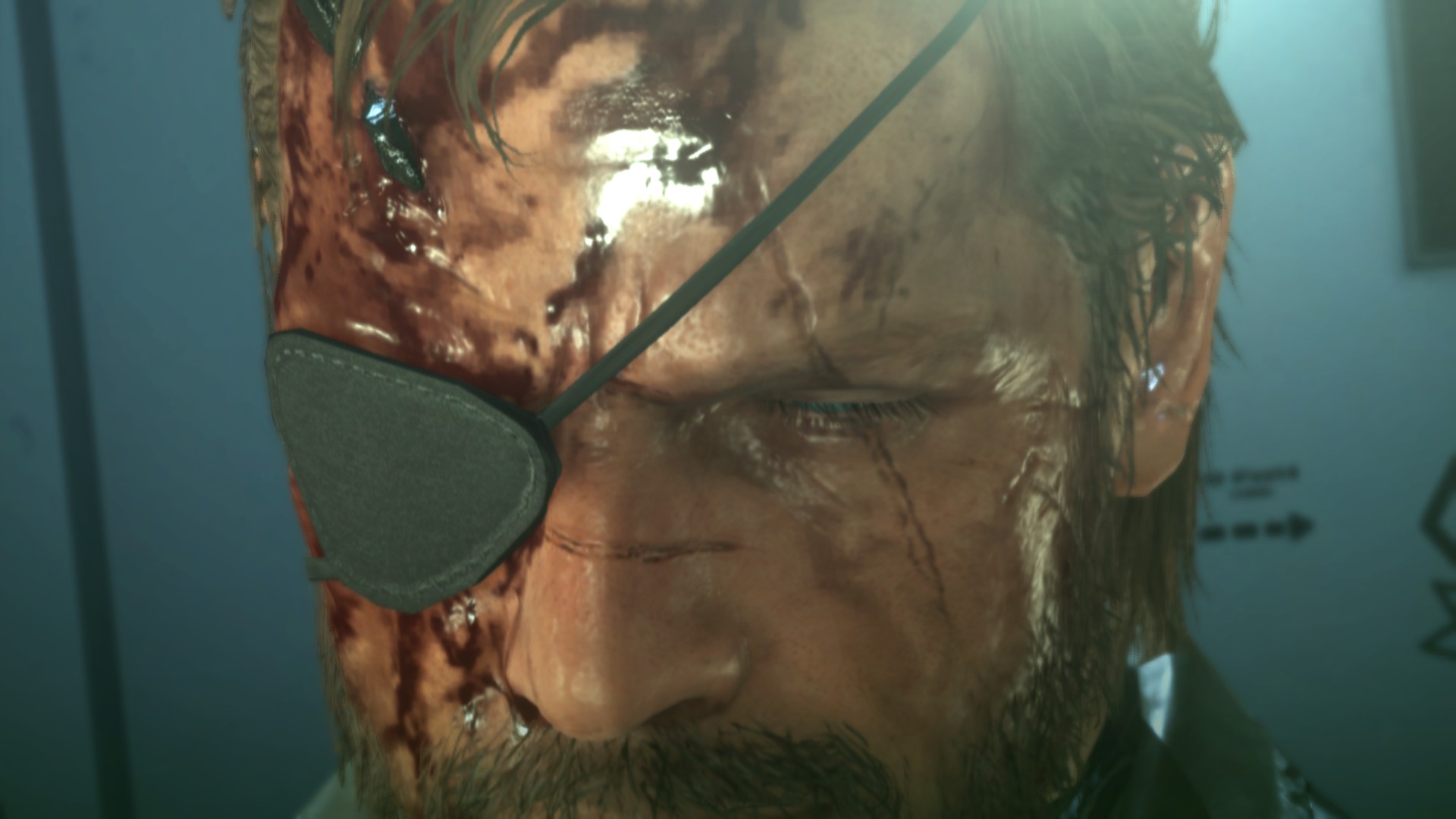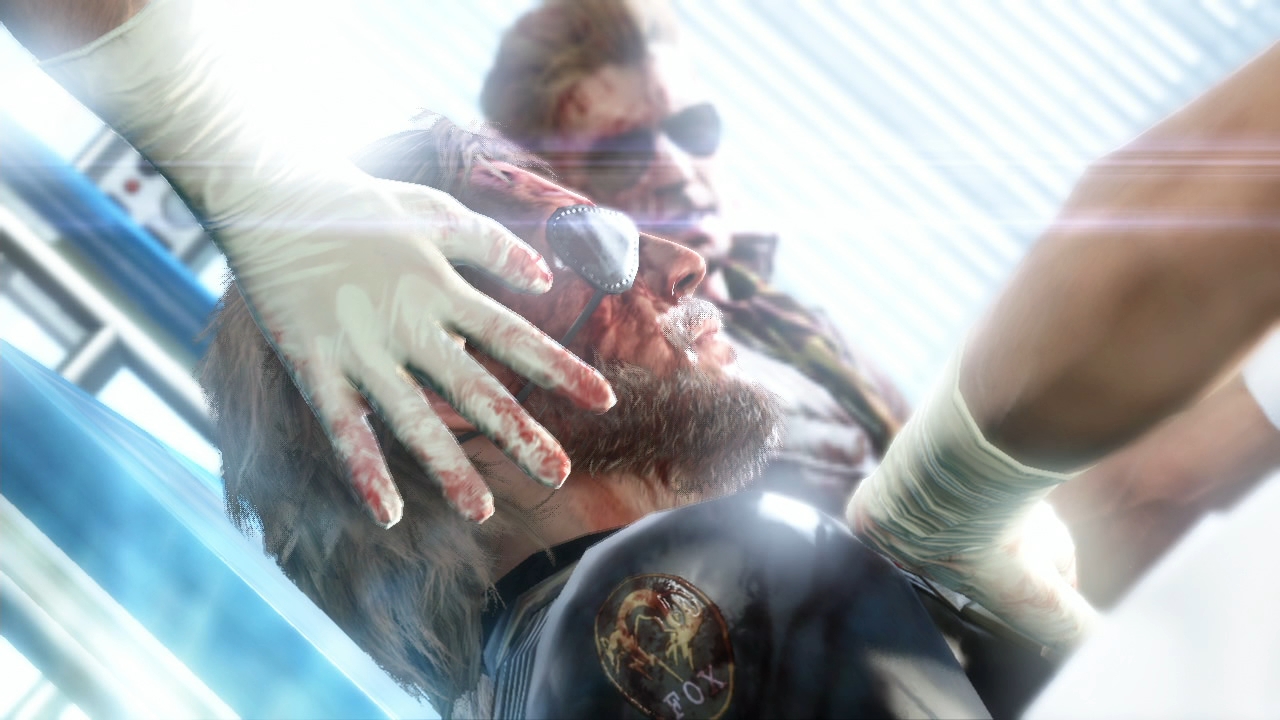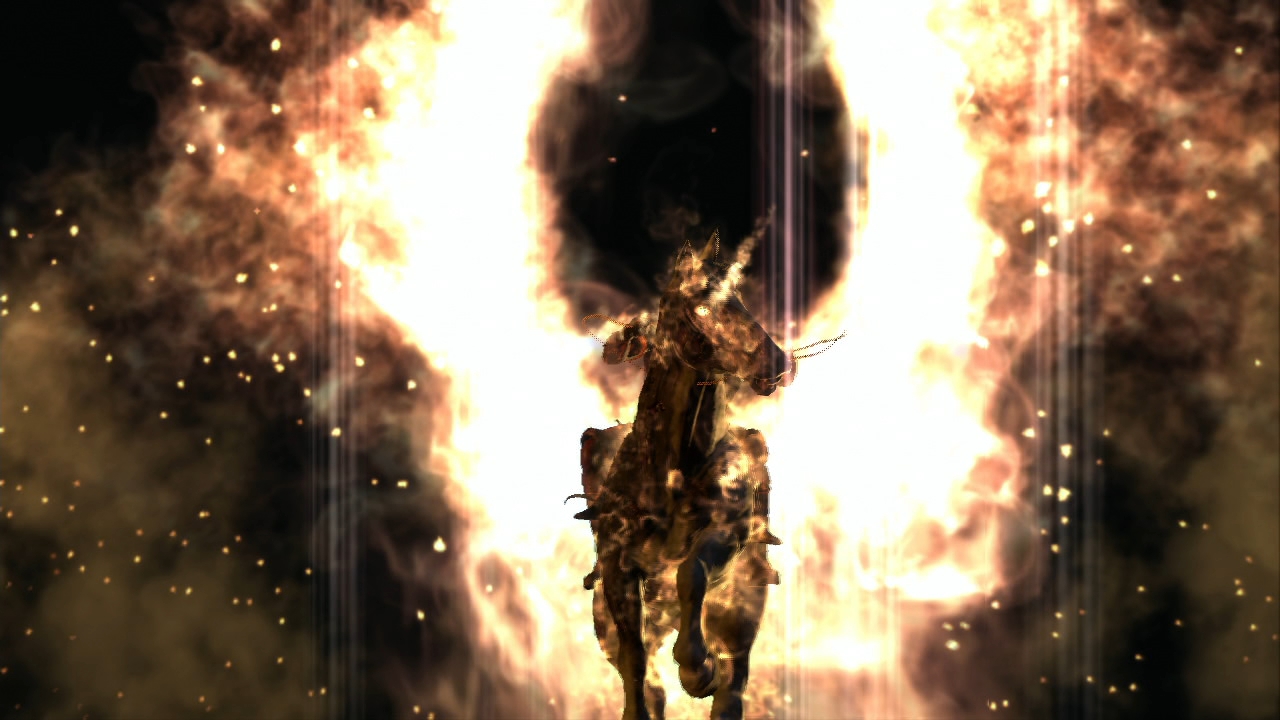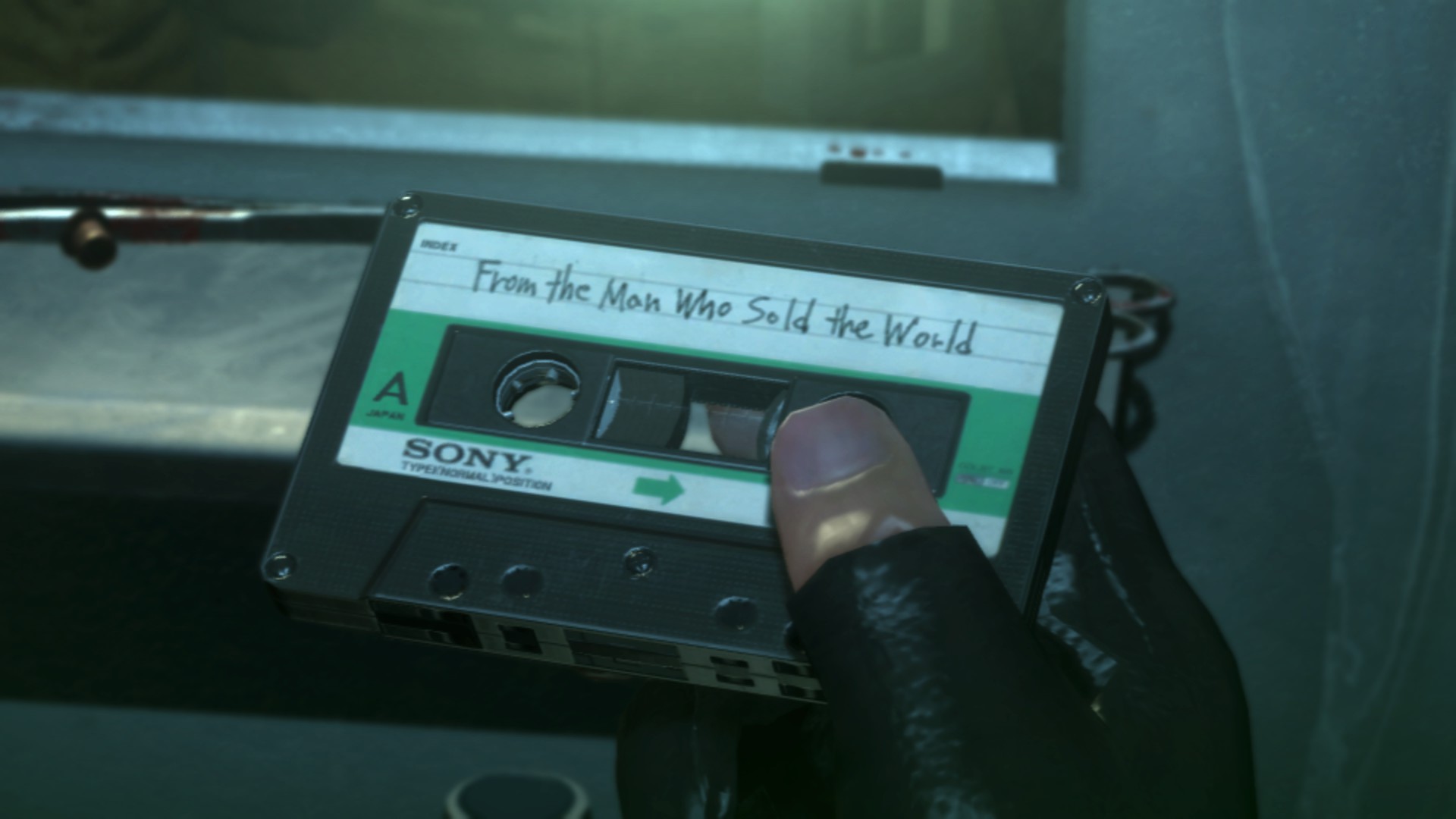Why MGS5’s ending is one perfect moment in a bad story

Spoilers for the entirety of Metal Gear Solid 5: The Phantom Pain’s story follow.
I really rated MGSV when it was released in September, and it already ranks as one of my favourite games of all time. It's a sandbox game that offers the sort of detailed stealth-action scenarios that Metal Gear has always been famous for, now on a gigantic scale. Sitting uneasily against that is Metal Gear's narrative baggage, over two decades of increasingly complicated lore that's woven into The Phantom Pain through brief, bland cutscenes and a ton of dull audiotapes you can listen to at your leisure.
To a PC audience coming to Metal Gear for the first time, I imagine it was a case of brushing the story to one side and cracking on with destroying watchtowers with rocket launchers while listening to The Cure—the game does allow you to divorce story from game in a way its predecessors didn’t. As someone who's followed the series very closely since the original Metal Gear Solid, though, I find so many of the creative decisions behind the story baffling in tone, approach and content. But there is still one key moment in this messy tale that lifts everything else about the game for me. The ending is amazing.
Months later I'm still dwelling on the biggest left turn in the story, which arrives at the end of the game’s second chapter. The key twist in MGSV's epilogue was pre-empted by fans months before release: that you are not, in fact, playing as the Big Boss as seen in Ground Zeroes, but instead a largely anonymous stand-in for the player called 'Medic' (who is renamed and customised by you in the game's prologue). This Big Boss, a post-credits timeline tells us, is the one Solid Snake will someday face in the original Metal Gear as part of the series’ continuity.
Like a lot of observers I was onto this from the start of MGSV's story. In my review-in-progress piece in September, I called this version of Snake 'an anonymous action hero' and ‘an empty vessel'. I was torn on whether this was the product of the story being deliberately light touch, as Kojima Productions’ response to criticism of Metal Gear’s absurdly long cutscenes, or because it was just too damned expensive to have Kiefer Sutherland in the recording studio for longer than a few days. The fact it's hard to figure this out is one of the story's many weaknesses, but there are others: a mostly dry script, an intro/outro that has almost nothing to do with the rest of the game, and the complete reliance on boring audio tapes to fill in background info.

The reveal is by far the most interesting thing about it, however, and it’s telegraphed throughout the game in many ways, some clever, some obvious. I reckon Ocelot's quote “You're a legend in the eyes of those who live on the battlefield” first heard all the way back in MGSV's E3 2013 trailer was a clear nod in that direction—that is, to anyone who looks at Venom Snake, he is Big Boss, even if it's just an artifice.
There are clear thematic connections between this character and MGS2's Raiden, who was deliberately manipulated through a sequence of events designed to mimic the circumstances of the original Metal Gear Solid. Raiden's path in Sons of Liberty was a smart comment on the player’s role, but MGSV's twist is much more disturbing and effective for me. Raiden may be a substitute for the player, but he also has his own history as a child soldier, as well as a real girlfriend and some sense of identity—he is still a character. In MGSV you spend tens of hours playing as someone with none of that. You are an impostor. As the ‘Medic’, you’re as anonymous as any of your loyal soldiers on Mother Base.
Keep up to date with the most important stories and the best deals, as picked by the PC Gamer team.
Its effect on my perception of the rest of the game has been huge. There are two levels on which you can enjoy this twist: the obvious one is that, like Raiden but more so, 'Medic' is the embodiment of the player, and this twist is designed to make you reflect on that. You were never Big Boss, of course. You're just pretending to be him.
Medic, then, is nothing more than whatever you've invested in him—and ultimately, my Big Boss has been through countless giant-scale battles, fought in the way that I wanted to, listened to Rebel Yell by Billy Idol because I like it and lived to tell the tale. The epilogue takes away the pillar of his identity as Big Boss, and all you're left with is every unscripted experience you've had in the battlefield, no backstory other than the one you’ve just created. The ending is about what MGSV the game is. More than any other entry in the series, V is a freeform experience shaped by your intent—and such an ending is a perfect thematic match for this game Kojima Productions has created, a true military action sandbox where few situations ever play out the same way. In the epilogue’s reveal cutscene, the real Big Boss explains on tape that you and him now share that title—your actions, as his phantom, as the player, have earned that status. You showed that becoming Big Boss requires nothing more than the commitment and self-conviction as the player to do so. Big Boss looks into the mirror, and you stare back.

There’s also another, more literal angle to the reveal I’ve been considering more and more. If you think of Medic not just as a symbol of the player, but as a character in that universe, his story is unusually tragic and unsettling. He’s first seen in Ground Zeroes, extracting the bomb from Paz, and when the second explosive goes off, he jumps in front of Big Boss to take the shrapnel without hesitation. Having lost nine years of his life to a coma, he then gives up his own identity to assume that of his ally for his protection, through both hypnotherapy and plastic surgery, then builds an entire army and forges relationships on an entirely false premise.
It brings yet another level of weirdness to his affectionate interactions with Quiet, too—in retrospect, that’s pretty much the only meaningful relationship he forges with any person in The Phantom Pain, and she thinks she’s interacting with the real Big Boss. But she never was.
What else do we know about the Medic, too? He eventually becomes evil Big Boss in the original Metal Gear on MSX—so there’s a period between The Phantom Pain where he goes from this relative hero character that you’ve created to someone who is ultimately corrupted. And who in the series’ lore remembers the Medic? Only Big Boss, Miller and Ocelot know who Venom Snake actually is. He’s a nobody, an unsung hero slotted into MGS lore.
I enjoyed so little about the story but find a lot of meaning in this one moment. I don’t mind that the cutscenes in MGS5 fill in very few of the gaps in the series’ timeline—for Metal Gear fans, MGS4’s barrage of cutscenes were surely enough to convince them that any more of that fan service torment was unwelcome. But the story feels deliberately unfinished—Quiet, Huey and Eli (Liquid Snake) all just vanish in various ways throughout chapter two, stripping more and more of Metal Gear’s lore away from The Phantom Pain. Hell, even the Metal Gear from the game is removed from the story when Eli steals Sahelanthropus in his final appearance in the story, all discussion about the cut ‘mission 51’ aside. There’s no closure in a grand cutscene—I believe you’re supposed to feel an emptiness as a player by the end of chapter two. In keeping with the twist, you look upon everything that’s left after the story’s played out—and it has little relation to Metal Gear as we knew it. What remains is what you’ve created.
It’s Mother Base, full of the men and women you’ve recruited. D-Dog, who you discovered and raised on the battlefield yourself. It’s your history with every mission and every Side Op. The Metal Gear-ness of it is all rendered largely irrelevant—it’s a fascinating statement of finality and a curious parallel to Kojima’s apparent departure from Konami. He’s seemingly gone, Kojima Productions is no more, and you’re only left with what you’ve built in his game. That couldn’t possibly have been deliberate—though the idea that it might be only adds to the myth behind its creation.

Don’t take this as a wholesale endorsement of the story—I have a number of major problems with the execution of it. For one, it feels like I’ve played through a non-canon entry in the series, without the same quality or style of voice acting I’m used to from the series, and without any of the scripting flavour or much of the humour. MGS5’s story felt aimless, and the decision to recast some characters like Snake and Ocelot but not others like Huey Emmerich smacks of random decision making that passes on zero benefit to players. The game itself is pure Metal Gear, but the scripted narrative stitched into it, including the endless boring audiotapes, is almost worthless. As a story in and of itself, it’s the worst in the series by far. This one reveal, however, which ties so deeply into the player’s role in MGS5, saves it for me. It’s a twist that’s entirely about playing a systems-driven sandbox game.
In my review-in-progress of MGS5, I made a point that a lot of other people have made as well: “Maybe the lack of a traditional narrative is the developers’ way of underlining that The Phantom Pain is about the stories generated by the players themselves.” The connections you can make in the battlefield with D-Dog, for example, or arguably even Quiet, are player-generated and little to do with the cutscenes or audiotapes.
But that one scripted twist enhances every unscripted moment. It says that the player's choices are all that matter, because there is no real character here except the one you decided to be. Take the legend of Big Boss away and all you have is the legacy of the player. “He was always the best man we had...” says the real Big Boss in the 'Doublethink' tape that unlocks after the game's conclusion. “This is just a detour in his journey to hell.”
Special thanks to Metal Gear thinker Dan Dawkins, who originally made the ‘stripping back’ observation to me, helped me articulate my thoughts on MGS5 in conversation and writes great Metal Gear pieces like this one.


